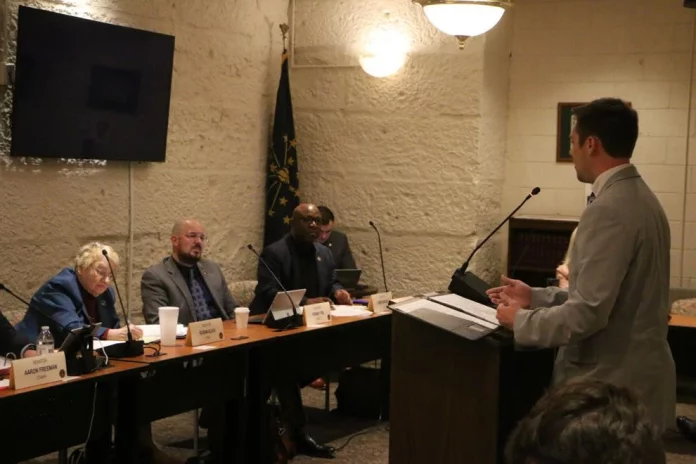Should police misconduct occur, critics say bill could hinder the public’s ability to witness it
- By Xain Ballenger, TheStatehouseFile.com
- Mar13, 2023Â
A bill giving police officers authority to order people to stay 25 feet away from the scene of an investigation or face a possible class C misdemeanor, was passed Tuesday, in the Indiana Senate Corrections and Criminal Law Committee
Howard County Police Capt. Jordan Buckley testifies in support of HB 1186 on Tuesday. Buckley was one of two law enforcement officers who testified in support of the bill.
House Bill 1186 was authored by Rep. Wendy McNamara, R-Evansville and passed the Senate committee, 5-2. It also passed the House 75-20 on Feb. 14. Only five people testified before the committee; three spoke in opposition, while two spoke in support.
Howard County Police Capt. Jordan Buckley was one of two police officers who gave testimony in support of the bill.
Buckley said that with “today’s society†the job of a police officer is “more difficult†than it has ever been in his career. Officers are finding themselves in difficult situations that can deteriorate quickly when the officer’s attention becomes “divided amongst those involved and those not involved in the matter at hand,†he said.
“Everybody wants to have an opinion on the police officer’s actions regardless of their interest in the matter,†he said. People expect officers to “hold court†in the street, Buckley said, and this is an “unsafe practice†that will often escalate situations and lead to further confrontation and possibly the use of force.
Buckley said the 25-foot perimeter wouldn’t be a “tape measure law†but instead would give police officers the “legal authority†to tell people to step back.
Student activist Jason Riley testifies in opposition to HB 1186 on Tuesday. He said the bill would hinder the ability of bystanders to film police officers.
By Xain Ballenger, TheStatehouseFile.com
“If someone has a problem, an officer would likely give the person a designated area they can be in—‘Step back to that pole, that tree, against the wall,’ whatever it is,†Buckley said. “If that person refuses and/or continues to close the gap after being told to move, then there are actions that can be taken …
“A police officer needs to be able to focus on the person or persons they are dealing with and not the distractions. … We must not forget that some people are just waiting for that one opportunity to flee or engage in a fist or fire fight.â€
Others testified in opposition to the bill, including Katie Blair, director of advocacy and public policy for the American Civil Liberties Union of Indiana and student activist Jason Riley.
Riley said the bill would hinder the ability of bystanders to film police officers and that it could hurt the ability of potential witnesses to police misconduct, but he offered a possible solution.
“One way to fix this is potentially amending it so that it would be illegal for police officers to intentionally prevent bystanders from filming or witnessing,†Riley said.
Rep. Wendy McNamara, R-Evansville, and Sen. Greg Taylor, D-Indianapolis, debate HB 1186 on Tuesday in the Senate Corrections and Criminal Law Committee.
By Xain Ballenger, TheStatehouseFile.com
Medical journal The Lancet reported in 2021 that between 1980 and 2018, there were an estimated 30,800 deaths resulting from police violence.
Police Scorecard, a group of data scientists, organizers and others working to create “the first nationwide public evaluation of policing in the United States,†put the number of Indiana deaths from police violence at 165 from 2013 to 2021. The report states that a Black person was more than four times more likely to be killed by police than a white person in the Hoosier state.
With the rapid proliferation of cell phones, bystanders have often filled the role of capturing police misconduct by switching on their cameras when they see police making an arrest. For example, in May 2020, teenager Darnella Frazier recorded the murder of George Floyd, touching off nationwide protests.
This relates to the point that Sen. Greg Taylor, D-Indianapolis, made when questioning McNamara. Taylor said that if the George Floyd incident happened in Indiana while this bill was in place, the police could have asked people who were filming to step back 25 feet and perhaps not capture what happened. He pointed out that the video was used in the trials of the officers.
McNamara responded that the bill “would not prevent anybody from doing any filming in this situation whatsoever.â€
Amelia McClure, executive director of the Hoosier State Press Association, told The Statehouse File she has concerns about how the bill could impact Hoosier journalists.
“Any bill that could hinder the public’s access to public officials performing official duties is concerning. It’s always tough to strike a balance between officer safety and accountability, but it is critical that access remains a top priority in those considerations,†McClure said.
“Journalists play a specific role in our democracy—they do not interfere with law enforcement but they do act as the eyes and ears of the people. It is critical that they are allowed to do so.â€
The StateHouse FIle reached out to McNamara for comment but did not hear back by press time
FOOTNOTE: Â nEditor’s note: This story has been updated to correct the number of people who spoke in support of and in opposition to the bill.Â
Xain Ballenger is a reporter for TheStatehouseFile.com, a news website powered by Franklin College journalism students.





